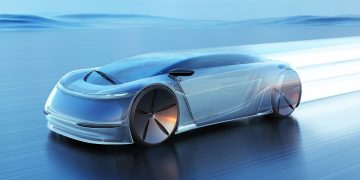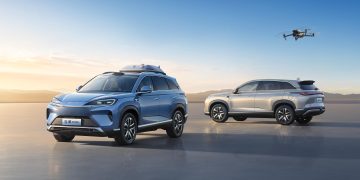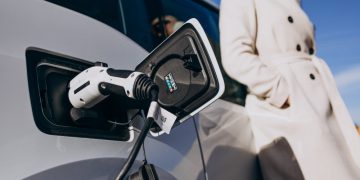Introduction: The Urgency of Global Climate Goals
Climate change has become one of the most pressing challenges of our time. The global scientific community, alongside world leaders, has emphasized the urgent need to reduce greenhouse gas (GHG) emissions to mitigate the worst effects of global warming. Among the sectors contributing to climate change, the transportation industry stands as one of the largest culprits, accounting for roughly 25% of global CO2 emissions. As cities expand and global demand for transportation increases, the need for sustainable alternatives becomes more urgent.
Electric vehicles (EVs) represent one of the most promising solutions to curb the emissions from the transportation sector. By transitioning from internal combustion engine vehicles (ICEVs) that run on fossil fuels to cleaner, more energy-efficient electric vehicles, we can make significant strides in meeting global climate goals, including those set by the Paris Agreement and the United Nations’ Sustainable Development Goals (SDGs).
This article will explore how the widespread adoption of electric vehicles can play a pivotal role in achieving the global climate objectives by reducing carbon emissions, enhancing energy efficiency, and facilitating the transition to renewable energy.
Section 1: The Role of Electric Vehicles in Reducing Greenhouse Gas Emissions
1.1 Reducing Tailpipe Emissions
One of the most direct ways in which electric vehicles contribute to meeting climate goals is by reducing greenhouse gas (GHG) emissions from tailpipe emissions. Internal combustion engine vehicles, which burn gasoline or diesel, release substantial amounts of carbon dioxide (CO2) and other harmful pollutants such as nitrogen oxides (NOx) and particulate matter (PM). These emissions contribute significantly to global warming, urban air pollution, and public health problems.
Electric vehicles, in contrast, produce zero tailpipe emissions. This results in a direct reduction in CO2 emissions, particularly in urban environments where traffic congestion and vehicle emissions are at their highest. By replacing traditional vehicles with electric vehicles, countries and cities can dramatically reduce the amount of GHGs released into the atmosphere.
- CO2 Emission Reduction: The shift to EVs means that for every mile driven, a significant reduction in CO2 emissions occurs compared to the combustion of gasoline or diesel. This is especially true when the electricity powering EVs comes from renewable sources such as solar, wind, or hydropower.
- Health Benefits: By reducing emissions from vehicles, EVs can improve air quality, contributing to better public health outcomes, and reducing the societal costs associated with respiratory and cardiovascular diseases linked to air pollution.
1.2 Reducing Carbon Emissions in the Production Process
Though the production of EVs (especially battery manufacturing) may have a higher carbon footprint than traditional vehicles, the life cycle emissions of EVs are still much lower. Over the lifetime of an electric vehicle, the total emissions savings from reduced tailpipe emissions far outweigh the emissions produced during manufacturing.
- Battery Production: The production of lithium-ion batteries used in electric vehicles requires energy, and the mining of materials such as lithium, cobalt, and nickel can have environmental impacts. However, advancements in battery recycling and sustainable sourcing of these materials are helping to reduce the carbon footprint of EV production. Over time, these technologies will further reduce the carbon cost of electric vehicle manufacturing.
- Efficient Energy Use: EVs are more energy-efficient than internal combustion vehicles. Whereas conventional cars waste a significant portion of the energy in fuel as heat, electric vehicles can convert over 80% of the energy from their battery into movement, further contributing to energy conservation.
Section 2: Transitioning to Renewable Energy
2.1 Integration with Clean Energy Sources
Electric vehicles (EVs) present a unique opportunity to decarbonize the transportation sector while simultaneously accelerating the transition to renewable energy. Unlike traditional vehicles, which rely on fossil fuels, electric vehicles can be powered by electricity from renewable sources, including solar, wind, and hydropower.
- Renewable Charging Infrastructure: By integrating electric vehicles with renewable energy sources, we can reduce the overall carbon footprint of transportation. The more EVs that are adopted, the greater the potential for countries to decarbonize the grid. If countries continue to invest in green energy infrastructure and implement policies to ensure the use of clean electricity for EV charging, the environmental benefits of EVs will grow exponentially.
- Vehicle-to-Grid (V2G) Technology: The development of V2G technology allows electric vehicles to not only draw power from the grid but also return stored energy to the grid during periods of peak demand. This energy storage capability can help stabilize grids and integrate renewable sources of energy, making the transition to clean power more feasible. EVs, in essence, can serve as mobile energy storage units that complement renewable energy production.
- Grid Decarbonization: As the global grid transitions to more sustainable energy sources, electric vehicles will continue to provide a mechanism to reduce the carbon footprint of energy consumption. This shift towards clean energy, powered by EVs, will help drive down GHG emissions in the energy sector.

Section 3: Accelerating the Shift Away from Fossil Fuels
3.1 Reducing Dependence on Oil
The widespread adoption of electric vehicles plays a key role in reducing global reliance on fossil fuels, particularly crude oil. The burning of oil for transportation is a major source of CO2 emissions. As countries transition to electric mobility, the demand for gasoline and diesel will decrease, contributing to the decarbonization of the transportation sector.
- Oil Demand Reduction: With more EVs on the road, global oil consumption could be significantly reduced, lowering the environmental impact of oil extraction, refinement, and transportation. In fact, the shift to electric vehicles could lead to a major reduction in global oil demand, which in turn could ease geopolitical tensions related to oil dependence.
- Energy Independence: For many countries, transitioning to electric vehicles can also reduce dependence on imported oil, contributing to energy security. The ability to produce electricity domestically from renewable sources further strengthens energy independence, reducing the vulnerability associated with reliance on foreign oil supplies.
Section 4: Supporting Global Climate Targets
4.1 Aligning with the Paris Agreement
The Paris Agreement, signed by 196 countries in 2015, sets ambitious targets to limit global temperature rise to well below 2°C, ideally to 1.5°C, compared to pre-industrial levels. To meet this target, global carbon emissions need to reach net-zero by 2050. The transportation sector, being one of the largest sources of emissions, plays a pivotal role in achieving these goals.
- EV Adoption as a Climate Solution: If electric vehicles make up a substantial portion of global vehicle fleets by 2030, it could reduce global transportation emissions by 50% by 2050, making them a crucial element in meeting the Paris targets. With supportive policies, financial incentives, and continued innovation in battery technology, the adoption of electric vehicles can be accelerated, directly contributing to climate change mitigation.
- Government Action and Policy: Countries around the world are setting EV sales targets and implementing policies that encourage electric vehicle adoption, such as subsidies, tax incentives, and emission reduction mandates. By aligning EV adoption strategies with climate commitments, governments can accelerate the decarbonization of the transportation sector.
4.2 Helping Achieve United Nations Sustainable Development Goals (SDGs)
The adoption of electric vehicles supports several of the United Nations’ Sustainable Development Goals (SDGs), particularly those focused on climate action (SDG 13), affordable and clean energy (SDG 7), and sustainable cities (SDG 11). By transitioning to cleaner vehicles, countries contribute to the global effort to reduce emissions, improve air quality, and enhance energy security, all of which are integral to achieving the SDGs.
Section 5: Future Prospects and Challenges
5.1 Overcoming Barriers to EV Adoption
While electric vehicles hold significant promise in achieving global climate goals, there are challenges that must be addressed to maximize their potential. These include:
- Battery Costs and Technology: High production costs, particularly for EV batteries, remain a barrier to widespread adoption. However, rapid advancements in battery technology and economies of scale are helping reduce costs, making EVs more accessible to consumers.
- Charging Infrastructure: The availability of charging stations is a key concern for EV adoption, especially in less developed regions. Expanding the charging infrastructure and making it more efficient and accessible will be crucial for mass EV adoption.
- Policy Support and Incentives: Governments play a vital role in creating favorable policies and financial incentives that promote the adoption of electric vehicles. Continued investment in clean transportation and renewable energy will be necessary to meet global climate goals.
Conclusion: Electric Vehicles as a Cornerstone for Climate Action
The widespread adoption of electric vehicles represents a critical step toward achieving the global climate goals outlined in the Paris Agreement and UN SDGs. Through their ability to reduce greenhouse gas emissions, integrate with renewable energy sources, and reduce global dependence on fossil fuels, EVs are poised to play a pivotal role in mitigating climate change and fostering a sustainable future.
As governments, businesses, and consumers continue to embrace electric mobility, the transportation sector will become a cornerstone of global climate action. Electric vehicles not only provide a cleaner, greener alternative to traditional gasoline-powered vehicles, but they also represent a broader shift toward a low-carbon economy, helping secure a healthier planet for future generations.











































